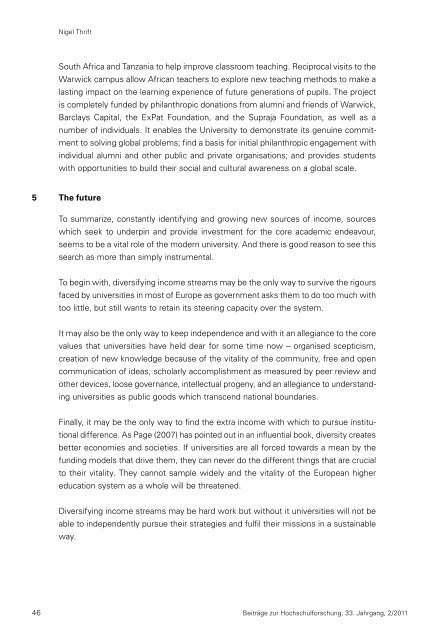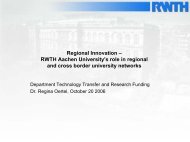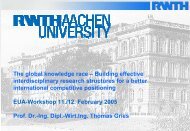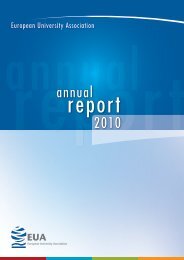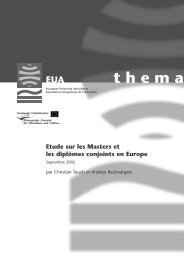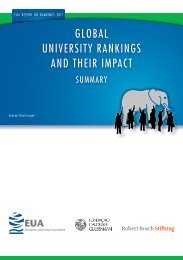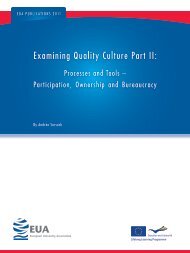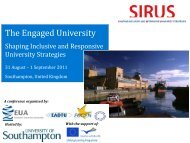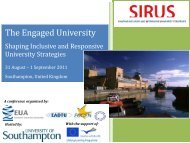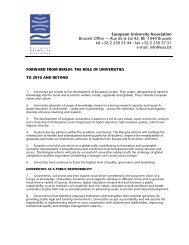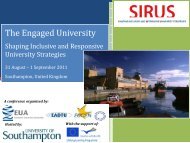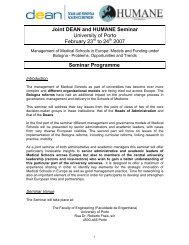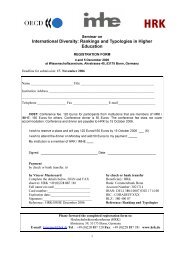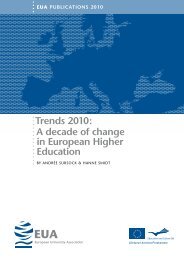Beiträge zur Hochschulforschung - European University Association
Beiträge zur Hochschulforschung - European University Association
Beiträge zur Hochschulforschung - European University Association
You also want an ePaper? Increase the reach of your titles
YUMPU automatically turns print PDFs into web optimized ePapers that Google loves.
46<br />
Nigel Thrift<br />
South Africa and Tanzania to help improve classroom teaching. Reciprocal visits to the<br />
Warwick campus allow African teachers to explore new teaching methods to make a<br />
lasting impact on the learning experience of future generations of pupils. The project<br />
is completely funded by philanthropic donations from alumni and friends of Warwick,<br />
Barclays Capital, the ExPat Foundation, and the Supraja Foundation, as well as a<br />
number of individuals. It enables the <strong>University</strong> to demonstrate its genuine commit-<br />
ment to solving global problems; find a basis for initial philanthropic engagement with<br />
individual alumni and other public and private organisations; and provides students<br />
with opportunities to build their social and cultural awareness on a global scale.<br />
5 The future<br />
To summarize, constantly identifying and growing new sources of income, sources<br />
which seek to underpin and provide investment for the core academic endeavour,<br />
seems to be a vital role of the modern university. And there is good reason to see this<br />
search as more than simply instrumental.<br />
To begin with, diversifying income streams may be the only way to survive the rigours<br />
faced by universities in most of Europe as government asks them to do too much with<br />
too little, but still wants to retain its steering capacity over the system.<br />
It may also be the only way to keep independence and with it an allegiance to the core<br />
values that universities have held dear for some time now – organised scepticism,<br />
creation of new knowledge because of the vitality of the community, free and open<br />
communication of ideas, scholarly accomplishment as measured by peer review and<br />
other devices, loose governance, intellectual progeny, and an allegiance to understand-<br />
ing universities as public goods which transcend national boundaries.<br />
Finally, it may be the only way to find the extra income with which to pursue institu-<br />
tional difference. As Page (2007) has pointed out in an influential book, diversity creates<br />
better economies and societies. If universities are all forced towards a mean by the<br />
funding models that drive them, they can never do the different things that are crucial<br />
to their vitality. They cannot sample widely and the vitality of the <strong>European</strong> higher<br />
education system as a whole will be threatened.<br />
Diversifying income streams may be hard work but without it universities will not be<br />
able to independently pursue their strategies and fulfil their missions in a sustainable<br />
way.<br />
<strong>Beiträge</strong> <strong>zur</strong> <strong>Hochschulforschung</strong>, 33. Jahrgang, 2/2011


